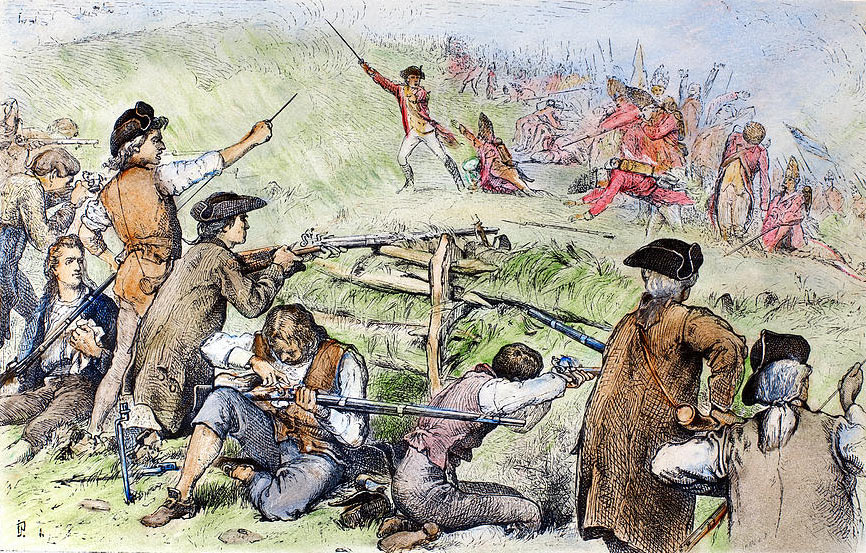Another Recovered Source on Bunker Hill
In late 1825 the historian Samuel Swett sent the Boston Daily Advertiser two accounts of the Battle of Bunker Hill sworn to before a Newburyport magistrate in 1818. I shared one yesterday.
The other was undoubtedly published in the Boston Daily Advertiser sometime from 21 to 25 December, but those issues aren’t included in the database I can access from home. The New-York Daily Advertiser for 26 December reprinted that second affidavit, crediting the Boston paper. So I’m taking this text from New York, quirky quotation marks and all.
The source was Philip Johnson, a native of Newburyport. His recollection was:
In a footnote, Swett also cited Johnson for this detail, not mentioned in the letter: “His Capt. Perkins, finding it waxed warm when they arrived at the neck, threw away his wig, and led his men over at single file, the mode generally adopted.” Alas, “threw away his wig” never became as iconic a phrase as “whites of their eyes.”
The other was undoubtedly published in the Boston Daily Advertiser sometime from 21 to 25 December, but those issues aren’t included in the database I can access from home. The New-York Daily Advertiser for 26 December reprinted that second affidavit, crediting the Boston paper. So I’m taking this text from New York, quirky quotation marks and all.
The source was Philip Johnson, a native of Newburyport. His recollection was:
Mr. Johnson states that he was a private in Capt. Benjamin Perkin’s company, and about 19 years of age, at the time of Bunker Hill Battle. The company proceeded as stated by Colonel [Joseph] Whitmore, till they came to within gunshot of the frigate Lively, [actually the Glasgow] which lay in the stream, and threw her shot across the neck—In his history of the battle, Samuel Swett quoted (imperfectly) only the portion of Johnson’s statement from “was at the rail fence” to “thick as peas.” Still, that one paragraph contained the most echoed phrase from the whole battle: “don’t fire till you see the whites of their eyes.” Earlier sources quoted Putnam saying nearly the same thing, but Johnson’s affidavit supplied the wording that became famous.
As the company were proceeding, a shot from the frigate struck in the rear of them, and appeared to startle some of the men. Some cried out, “it is a shell.” Lieut. (now Colonel) Whitmore, immediately jumped over the fence, where it struck, took the ball and showed it to the company, and observed, ‘it was only a ball.’
When they crossed the neck, Capt. Perkins ordered the men to go in single file six feet apart. They reached Bunker Hill without any loss. The company were principally scattered, and the men took their places where they could find them. Mr. Johnson passed the redoubt and went to the left to the rail fence; he went back again and went into the redoubt. He was soon crowded out of the redoubt, and he and a Mr. [Jacob] Knapp of the company went again to the rail fence. All this was before the battle commenced.
While he was at the rail fence, and just before the battle commenced, he saw Gen. [Israel] Putnam on horseback very near him, and distinctly heard him say, “Men, you know you are all marksmen; you can take a squirrel from the tallest tree; don’t fire till you see the whites of their eyes.’
Immediately after the first retreat of the British, Gen. Putnam rode up and said, ‘Men, you have done well, but next time you will do better, aim at the officers.’
The third time the British came up to the redoubt, they entered without much firing, and the retreat commenced.
Just as Mr. Johnson left his place at the rail fence, which was about half a gunshot from the redoubt, Gen. Putnam rode up, his horse covered with foam, and said something, he does not distinctly know what, and rode off. The balls were flying as thick as peas.
The particular manner in which the British came up the hill, and their several evolutions, Mr. Johnson does not recollect with sufficient accuracy to state. He heard no cheering by the Americans, till after the first retreat of the British. There were fifteen or sixteen killed and wounded in his company.
Mr. Johnson will excuse our preserving the very expressions he used, as the statement is so much more valuable for being a literal copy, though it was not intended for publication. He received in the engagement a slight wound in the hand.
In a footnote, Swett also cited Johnson for this detail, not mentioned in the letter: “His Capt. Perkins, finding it waxed warm when they arrived at the neck, threw away his wig, and led his men over at single file, the mode generally adopted.” Alas, “threw away his wig” never became as iconic a phrase as “whites of their eyes.”


1 comment:
I promise you, John, I will work that wig line into a Bunker Hill talk!
Post a Comment